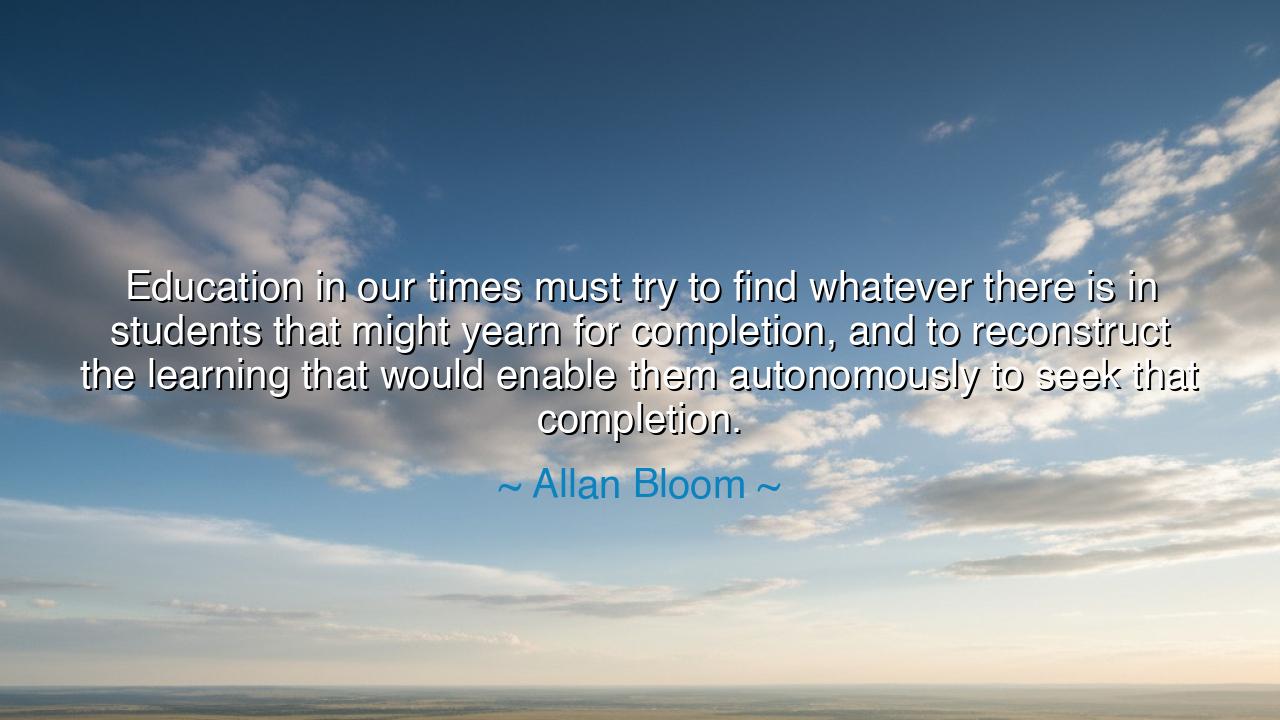
Education in our times must try to find whatever there is in
Education in our times must try to find whatever there is in students that might yearn for completion, and to reconstruct the learning that would enable them autonomously to seek that completion.






Hear, O children of wisdom, the words of Allan Bloom, philosopher of the modern age: “Education in our times must try to find whatever there is in students that might yearn for completion, and to reconstruct the learning that would enable them autonomously to seek that completion.” In this saying lies a truth both eternal and urgent. For man is not born whole—he is born longing, unfinished, restless, seeking. The task of education is not merely to fill his mind with facts, but to answer that silent hunger for wholeness, to guide him toward the fullness of his being.
What is this completion of which Bloom speaks? It is not mere employment, nor worldly success, nor the shallow praise of others. It is the inward harmony of a soul that has discovered its purpose, the unity of mind, heart, and spirit in pursuit of truth. Every student carries within them this yearning, though many do not know it. They sense an emptiness, a longing for more, a desire to be made whole. The duty of education is to awaken this yearning, to call it by name, and to provide the tools by which the student may pursue it freely and with dignity.
The ancients knew this well. Consider Plato, who taught that the soul longs for the realm of forms, for truth and beauty beyond the shadows of the cave. His education was not meant to chain the mind to memorization but to liberate it, so it could turn from darkness to light, from illusion to reality. His Academy sought to cultivate not obedient servants, but autonomous seekers of wisdom. Bloom, steeped in this tradition, called upon modern times to remember that true learning must guide the soul toward its own completion, not merely fit it to the machinery of society.
Reflect, too, on the life of Helen Keller. Stricken in childhood with blindness and deafness, her world was at first silence and shadow. Yet within her, there was a yearning—a hunger for completion—that could not be extinguished. When Anne Sullivan came as her teacher, she did not impose mere drills upon her; she awakened that inner fire, showing Helen the key to language, to knowledge, to connection. Helen’s story proves Bloom’s teaching: when education touches the deepest yearning of the soul, the student becomes not only a learner but a self-guided force, able to pursue truth with independence and power.
But Bloom warns also of the danger of forgetting this sacred duty. In our times, many reduce education to training for the marketplace, to skills without soul, to information without wisdom. Such learning may fill the mind, but it leaves the heart empty. A society that treats its children as tools rather than souls risks raising generations who are clever but not wise, capable but not whole. This is not completion, but fragmentation, a people who labor without vision and live without meaning.
The power of Bloom’s words lies in his call to reconstruct learning. The old forms may not suffice for our age; the path must be renewed. Teachers must not only instruct but inspire, not only explain but awaken. They must look upon each student not as a vessel to be filled, but as a soul to be stirred, a flame to be kindled. And students, once awakened, must take up the responsibility to seek their own completion, not waiting for others to hand it to them, but striving with courage and autonomy.
Therefore, O seekers, take this lesson: find within yourself that yearning for completion—that desire to be whole, to live not only with knowledge but with wisdom, not only with skill but with purpose. Seek teachers who awaken, and strive to become such teachers for others. Read not only for information but for transformation. Learn not only to advance in the world, but to advance in the soul. For the true end of education is not the degree nor the honor, but the fullness of a life that has discovered its meaning.
The final word is this: as Bloom has spoken, so it must be remembered. Education is not merely the preparation for work; it is the preparation for life. To awaken the yearning for completion, to pursue it with freedom, to become whole—that is the highest task of teacher and student alike. Let none rest until they have sought it, for in this lies the path to both personal greatness and the renewal of the world.






AAdministratorAdministrator
Welcome, honored guests. Please leave a comment, we will respond soon